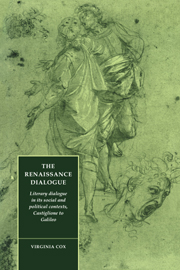 The Renaissance Dialogue
The Renaissance Dialogue Book contents
- Frontmatter
- Contents
- Preface
- 1 Problems of method
- 2 History and invention in the dialogue
- 3 The uses of the dialogue in sixteenth-century Italy: celebration and control
- 4 The uses of the dialogue in sixteenth-century Italy: commerce and courtesy
- 5 Castiglione's Cortegiano: the dialogue as a drama of doubt
- 6 The changing form of the Italian Renaissance dialogue
- 7 The theory and practice of the dialogue in Counter-Reformation Italy
- 8 From the ‘girevole strada’ to the straight and narrow path
- 9 From the open dialogue to the closed book
- Notes
- Bibliography
- Index
5 - Castiglione's Cortegiano: the dialogue as a drama of doubt
Published online by Cambridge University Press: 05 December 2011
- Frontmatter
- Contents
- Preface
- 1 Problems of method
- 2 History and invention in the dialogue
- 3 The uses of the dialogue in sixteenth-century Italy: celebration and control
- 4 The uses of the dialogue in sixteenth-century Italy: commerce and courtesy
- 5 Castiglione's Cortegiano: the dialogue as a drama of doubt
- 6 The changing form of the Italian Renaissance dialogue
- 7 The theory and practice of the dialogue in Counter-Reformation Italy
- 8 From the ‘girevole strada’ to the straight and narrow path
- 9 From the open dialogue to the closed book
- Notes
- Bibliography
- Index
Summary
E grande errore parlare delle cose del mondo indistintamente e assolutamente e, per dire cosi, per regola.
Francesco Guicciardini, Ricordi (1530)… non solamente a voi po parer una cosa ed a me un'altra, ma a me stesso poria parer or una cosa ed ora un'altra.
Baldassare Castiglione, II libro del Cortegiano (1528)Up to this point, in attempting to account for the popularity of the dialogue in the Italian Renaissance, I have been stressing the social and diplomatic aspects of writers' use of the form. This emphasis has been intended as a corrective, since these powerful factors in the dialogue's appeal have been very largely ignored in the past, by historians and critics intent on the philosophical significance of the genre. This is not to say, however, that other, methodological or epistemological concerns may not also have a role in individual writers' decision to adopt a dialogue form in their works. It would be as misleading to interpret a writer's choice of the dialogue form simply as an exercise in literary etiquette as it would be to ignore the weight that questions of etiquette may have had in this choice.
The phrase from the Cortegiano quoted above, as an epigraph to this chapter, comes from a passage at the beginning of the dialogue, in which Lodovico da Canossa is expressing his misgivings about his suitability for the task which he has been given, of ‘forming the perfect courtier in words’.
- Type
- Chapter
- Information
- The Renaissance DialogueLiterary Dialogue in its Social and Political Contexts, Castiglione to Galileo, pp. 47 - 60Publisher: Cambridge University PressPrint publication year: 1992
